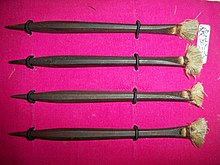Shurikenjutsu

Negishi-ryū Shuriken (c.1850)
|
|
| Focus | Weaponry (Shuriken) |
|---|---|
| Hardness | Non-competitive |
| Country of origin |
|
| Olympic sport | No |
Shurikenjutsu (手裏剣術?) is a general term describing the traditional Japanese martial arts of throwing shuriken, which are small, hand-held weapons used primarily by the Samurai in feudal Japan, such as metal spikes bō shuriken, circular plates of metal known as hira shuriken, and knives (tantō).
Shurikenjutsu was usually taught among the sogo-bugei, or comprehensive martial arts systems of Japan, as a supplemental art to those more commonly practiced such as kenjutsu, sojutsu, bōjutsu and battlefield grappling kumi-uchi (old form jujutsu), and is much less prevalent today than it was in the feudal era.
There is a lack of reliable documentation regarding the art's history when compared to other arts, however there are various oral traditions peculiar to each school (Ryu), that describe how their art developed and came to be used within their system.
The art possesses many originators and innovators who discovered and developed their own various methods of adapting everyday objects into throwing weapons, hence the wide variety of both schools and blades. Furthermore, the art itself is typically quite secretive, as shurikenjutsu gains its tactical advantage by using stealth and surprise. Shuriken are small and easily concealed, yet they have the versatility of being used as a stabbing weapon at close range (called shoken if used in this manner), as well as a longer range thrown weapon).
Shuriken consist of two basic designs:
The decree to outlaw shurikenjutsu during Japan's Tokugawa period drove the practice underground, and further shrouded it in secrecy. As the Edo-era drew to a close, the abolition of the Samurai caste system and the subsequent modernization of Japan's military, lead to the near extinction of shurikenjutsu. In fact, of the 50 or so styles which once existed, only a few remain fully intact today; passed down over the generations via an unbroken lineage. The only specialist school to have survived is the Negishi-ryū, which was founded by Negishi Shorei in the mid-1800s. Modern-day shurikenjutsu authorities, Naruse Kanji 成瀬関次(1888 - 1948) and Fujita Seiko 藤田西湖(1899 - 1966) also transmitted valuable information to future generations in the form of articles, books, photos and illustrations. Today, the largest organization focusing on the use of shuriken is the Meifu Shinkage-ryū, a modern-day school, founded by Someya Chikatoshi in the late 1970s.
...
Wikipedia
